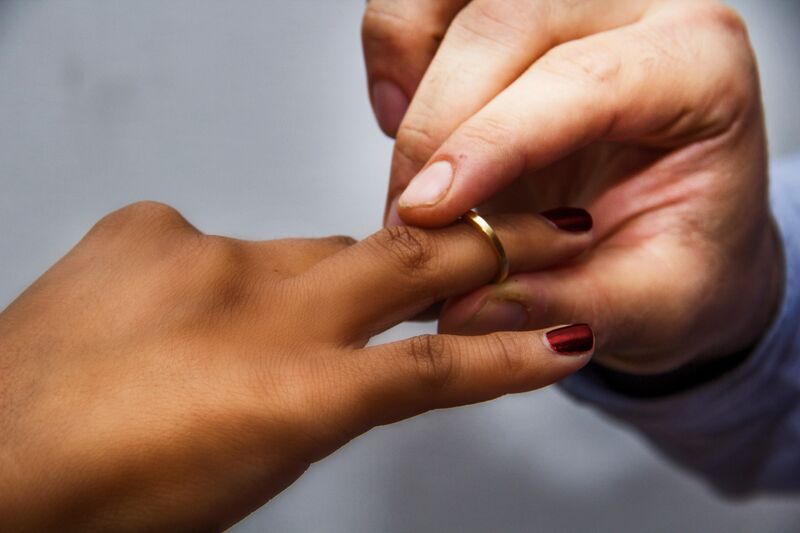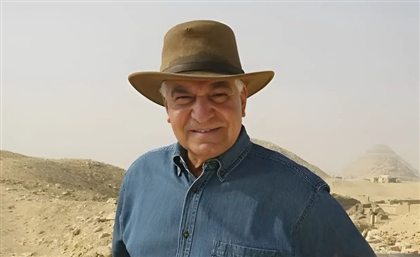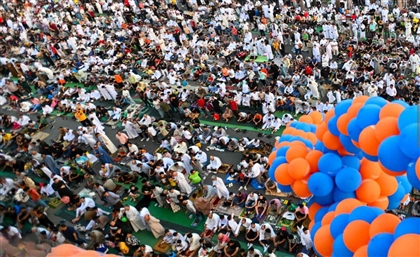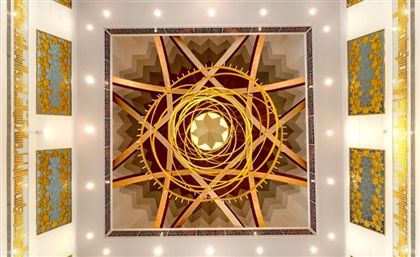Intercultural Marriage: The Struggles of Egyptian Women Dating Foreign Men
Intercultural marriage is a welcome venture in Egypt, as long as it involves an Egyptian man. But what happens when it’s the woman who wants to marry a foreigner? Valentina Primo delves into the stories of three young women to unveil their struggles while seeking a transnational relationship.

She returned home with the feeling that something had changed. Her travels had not only opened her horizons, but given her the chance to encounter men whose hearts felt close to her. Nouran was convinced that she could find a lifelong partner away from Egypt, but she knew she would never be allowed to by her family.
“I don’t want to get married to a foreigner because I want a liberal person; there are tons of Egyptian liberal men, that’s not the point for me. I just think that the type of mentality I reached is not compatible with Egyptian guys,” says Nouran, as she recalls hundreds of conversations with her foreign male friends where spirituality, energies, aura, and the power of nature took center stage. “If u discuss this with an Egyptian man, he probably won’t disagree, but he will make fun of you,” she says.
Despite not being extremely conservative, Nouran’s parents do not approve of her marrying a foreign man. A combination of tradition, cultural norms, and religion have turned it into an unbreakable rule. “They say they do not accept it because the children follow the dad’s religion,” she explains. Although Islamic traditions often allow for the marriage to take place provided the man converts to Islam, Nouran says her family would not give her consent.
“When I ask why it is forbidden from a rational point of view, they tell me it’s because of the conflicts I will face when marrying a man with a different religion. They are worried that I will not be able to continue practices such as fasting in Ramadan, and that being exposed to two different cultures might create confusion in my children's mentality and personality. Plus, they say they will be always worried of me living in a different continent with someone they don't know well,” says the 25-year-old woman, who works as an interior decorator. “They don’t only object to non-Muslims, but any non-Arab foreigner because they wouldn’t like to have someone who doesn’t speak the native language to avoid any difficulties in communicating.”
“But I actually find the barrier of languages fun; I think that not speaking your native language with your spouse would create less fights you won’t be able to really swear at him or really express your anger like you express it in your own native language,” she says.
Nouran’s story is not unique. Although intercultural marriages are often accepted when Egyptian or Arab men marry a foreign woman, marriages that involve a foreign man do not enjoy the same level of social acceptance. “Aside from the fact that there are couple of foreigners who would be really compatible for me, I would love every Egyptian girl to have the option of choosing the man they marry,” she says.
“I believe Islam was meant to be liberating especially for oppressed women,” she adds, “And I really can’t understand the fact behind marrying someone despite his character flaws just because they’re Muslim.”
Walks and frowns
Malak* met her husband while he was carrying out an internship in her hometown Cairo. Having started dating at the fresh age of 19, her family met him and was quickly fond of her English fiancé who knew, however, that he would have to convert to Islam in order to marry her.
“I was lucky because he knew Arabic very well and had always had an interest in Islam and the Qur’an, so converting for him was not a problem; he actually fasts more than I do,” says Malak. Married since 2009, the couple has lived together in England, Italy and Egypt, where they recently moved with their new-born child.
“My family accepted it since the beginning and gets along really well with him,” she says. When in the streets, however, she often felt harassed as passers-by would frown at the sight of an Egyptian woman with a non-Arab man. “I remember taking a walk while I was on holiday in Dahab, and hearing a little girl call me ‘sharmuta’ (whore),” she recalls.
“The Egyptian society seems very judgmental, especially those living abroad,” says the 27-year-old woman. “Men would constantly ask me ‘why’, as if I needed a reason to marry someone from another land.”
“It is not an Egyptian thing”
For Nesma*, the choice came as a realisation after dating her first boyfriend during her teenage years. “We were very young, and I didn’t really relate to his teenage mentality,” she says. So when she met an American young man whom she fell in love with, it was a transitional moment. “Even though I could never be together with him, I began thinking that maybe I should date foreign men because I could relate more to them; I wanted someone who would not tell me what to do and what not to do,” she says.
“My first boyfriend would tell me what to wear and not to wear, or every time I had a male friend he would tell me to back off,” she recalls, “So I broke out of that and just wanted the complete opposite."
While she was moving abroad, she met Charlie*, a French man who was moving to the same city, and they started dating shortly after. “We were both in a foreign land, and we clicked instantly,” she explains. As the relationship grew, Nesma invited him to Egypt and introduced him to her parents; and after a few months, they got engaged. “My family is rather conservative, but they wouldn’t object to us marrying as long as he converts to Islam. They also didn’t mind that we lived together abroad, but it was sort of a ticking clock as they expected the wedding. It’s more of a cultural than religious thing,” she considers.
However, as the couple broke up after four years, Nesma changed her outlook on the stereotypes she had associated with her partners’ origins. “Through the relationship, I realised that trouble follows; that possessive relationships are not just an Egyptian thing,” she says.
“He totally changed my view about foreigners. A big part of the reason we are not together is the mentality, which is kind of oppressive; so I came to the conclusion that it doesn't matter whether someone is a foreigner or not; it’s the personality,” she points out. “Whether we get back together or not, in the end, living with him made me realise that the patriarchal mentality is out there and has nothing to do with being Egyptian.”
Despite the fact that Charlie did not mind converting to Islam in order to marry her, Nesma considers the rule that men have to become Muslim in order to marry unfair. “It’s not religious but cultural, it’s society who makes it mandatory to convert. They say it’s just for the children; but I am going to teach my baby what I was taught by my culture, and he is still going to tell his child to be a good person, and then he can decide when he is old enough,” she explains. “I find it ridiculous to have to abide by the same religion in order to raise a family, and it is not logical that men can marry a woman of another religion but women can’t”.
*In order to protect the interviewees’ privacy, some names have been changed.
- Previous Article Manipuri: Sofitel El Gezirah Gets a Taste of India
- Next Article Award Winning Novelist Gamal Al Ghitani Dies At Age 70
Trending This Week
-
Mar 29, 2025























